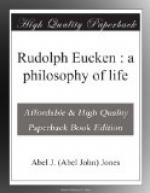Eucken’s discussion of faith and doubt is very illuminating. He protests against the conception of faith which concerns itself merely with the intellectual acceptance of this or that doctrine. This narrows and weakens its power, confining it to one department of life; whereas faith is concerned with the whole of life.
Faith is for Eucken “a conviction of an axiomatic character, which refuses to be analysed into reasons, and which, indeed, precedes all reasons ... the recognition of the inner presence of an infinite energy.”
If faith concerns itself with, and proceeds from the whole of life, it will then take account of the work of thought, and will not set itself in opposition to reason. But it will lead where reason fails. It is not limited by intellectual limitations, though it does not underrate or neglect the achievements of the intellect. Faith enables life to “maintain itself against a hostile or indifferent world; ... it holds itself fast to invisible facts against the hard opposition of visible existence.”
The vital importance of such faith to religion is clearly evident; and bound up with this is the significance of doubt. Doubt, too, becomes now, not an intellectual matter, but a matter for the whole of life. “If faith carries within itself so much movement and struggle, it is not surprising ... if faith and doubt set themselves against each other, and if the soul is set in a painful dilemma.” Eucken considers it to be an inevitable, and indeed a necessary accompaniment of religious experience, and his own words on the point are forcible and clear. “Doubt ... does not appear as something monstrous and atrocious, though it would appear so if a perfect circle of ideas presented itself to man and demanded his assent as a bounden duty. For where it is necessary to lay hold on a new life, and to bring to consummation an inward transformation, then a personal experience and testing are needed. But no proof is definite which clings from the beginning to the final result, and places on one side all possibility of an antithesis. The opposite possibility must be thought out and lived through if the Yea is to possess full energy and genuineness. Thus doubt becomes a necessary, if also an uncomfortable, companion of religion; it is indispensable for the conservation of the full freshness and originality of religion—for the freeing of religion from conventional forms and phrases.”
Eucken’s views on immortality have already been dealt with. He does not accept the Christian conception of it, for he seems to limit the possibility to those in whom spiritual personalities have been developed, and he evidently does not believe that the “natural individuality with all its egoism and limitations” is going to persist.




